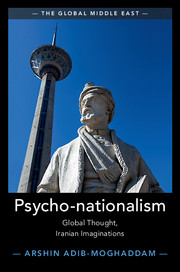Book contents
- Psycho-nationalism
- The Global Middle East
- Psycho-nationalism
- Copyright page
- Dedication
- Contents
- Introduction: Love and Politics
- 1 National Hysteria: Roma O’ Morte
- 2 International Hubris: Kings of Kings and Vicegerents of God
- 3 Geographic Dislocations: Iran Is in India
- 4 Religious Neuroses: Islam and the People
- 5 Un-national Therapy: Freedom and Its Discontents
- 6 Sexing the Nation: Subversive Trans-localities
- Bibliography
- Index
3 - Geographic Dislocations: Iran Is in India
Published online by Cambridge University Press: 07 December 2017
- Psycho-nationalism
- The Global Middle East
- Psycho-nationalism
- Copyright page
- Dedication
- Contents
- Introduction: Love and Politics
- 1 National Hysteria: Roma O’ Morte
- 2 International Hubris: Kings of Kings and Vicegerents of God
- 3 Geographic Dislocations: Iran Is in India
- 4 Religious Neuroses: Islam and the People
- 5 Un-national Therapy: Freedom and Its Discontents
- 6 Sexing the Nation: Subversive Trans-localities
- Bibliography
- Index
Summary
I have argued that in the course of building a modern nation-state, a project that was given impetus by the Safavid dynasty in the sixteenth century, the political classes governing Iran have developed a psycho-nationalist discourse and a corresponding historical imagination that casts tall shadows on the international affairs of the country. In many ways, psycho-nationalism in Iran indoctrinated a political class to manoeuvre between sudden bouts of hegemonic foreign policies and trying to ensure the mere survival of the state. In both cases and throughout Iran's contemporary history, the elites governing the country never really understood how to take advantage of the multicultural and multi-ethnic composition of the country. They have been quite literally at war with history in order to invent, produce and prove a very particular, rather divisive and retroactive national identity for Iranians. There was no effort to increase the geography of the meaning of Iran which would have required acknowledging a wider historical space for the country.
In this chapter, I will show how at different periods in history the idea of Iran was produced in India, in order to demonstrate that the meaning of Iran transcends geography, even if psycho-nationalism is a strong border-creating device. The construction of any nation radiates beyond the confines of the nation-state and its psycho-nationalist narrators. India is a good place to start my critique of psycho-nationalism and to ease ourselves into the second part of the book which weaves in forms of ‘psycho-therapeutic’ resistance. Of course, the confines of this book do not allow me to present an exhaustive history of Indo-Iranian relations, and this would not be conducive to my emphasis on psycho-nationalism. Nonetheless, it is possible to sketch some central nodal points holding the Indo-Iranian narrative together in order to show how ideas about nationhood can be dislocated from their usual habitat. To that end, this chapter begins by drawing the contours of what I call an ‘Indo-Iranian dialectic’ through a survey of cultural exchanges and their impact on religion, literature and politics. This Indo-Iranian dialectic can be conceptualised as a historical imaginary that impinges on the mutual perception of both countries. In many ways India and Iran are embedded within each other.
- Type
- Chapter
- Information
- Psycho-nationalismGlobal Thought, Iranian Imaginations, pp. 68 - 88Publisher: Cambridge University PressPrint publication year: 2017



